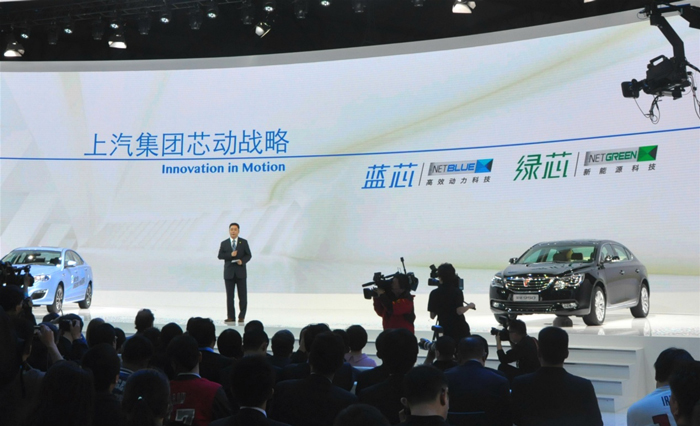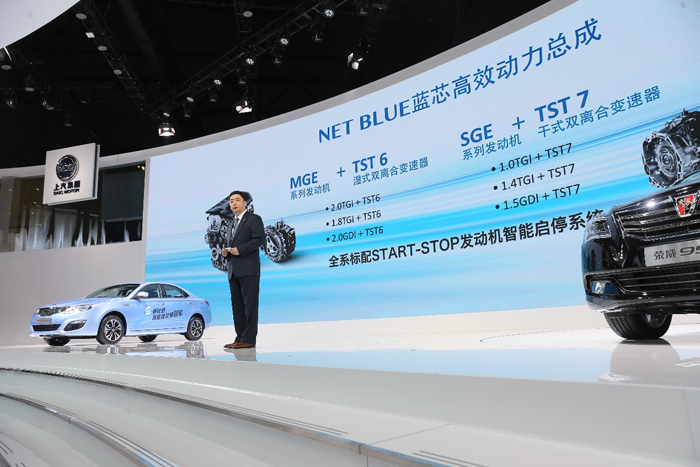SAIC Motor's two technologies promise oil consumption cut by 2020

SAIC launches the forward-looking core strategy and rolls out two technology brands -- NetBlue and NetGreen in Shanghai
At the Shanghai International Automobile and Manufacturing Technology Exhibition on April 20, SAIC Motor launched its forward-looking core strategy and rolled out two technology brands -- NetBlue and NetGreen, which focuses on traditional power and new energy technology, respectively. The strategy represents SAIC Motor's commitment to the country's energy conservation and discharge reduction goal and its social responsibility. It will upgrade the whole vehicle performance and fuel economy through power assembly technology reform. At the same time, the strategy will reduce carbon emissions and find a solution to the contradiction in blue sky and driving.
ROEWE and MG vehicle models were all displayed at the expo. The ROEWE 950 1.8T made debut. The brand also launched its new slogan Taste Technology and Know You and Driving. The MG GS has become a hit at the expo for going from zero to 100 kph in eight seconds and its representative -- famous UK international movie star Benedict Cumberbatch. The 2015 MG3, MG GT and MG6 also showcased their charm. In addition, the MG GS IGS intelligent drive vehicle also met the public for the first time.
NetBlue, traditional power
NetBlue and NetGreen are forces behind SAIC Motor's future development. NetBlue focuses on traditional power and efficient dynamic technology. It strives to develop internationally competitive powertrain products.

SAIC Motor launched a new-generation of efficient powertrains last year, including the MGE and SGE series direct injection engine, TST 6-speed and 7-speed dual clutch transmissions, as well as new engine start stop system. By 2020, SAIC Motor Passenger Vehicle's products will achieve a 20 percent cut in carbon dioxide, and a 20 percent increase in dynamic and economic upgrade each. The launch of the new powertrain marked the company's technology has been on a par with internationally advanced level.
NetBlue technology will be a trump card for SAIC Motor to compete against transnational auto companies. SAIC Motor will launch new-generation small-displacement engine SGE 1.5T in 2017, which will cut oil consumption by seven percent as compared with the existing one, making oil consumption merely at 5 liters per 100 kilometers. By 2020, SAIC Motor will produce the next-generation NetBlue engine and gearbox, with both performance and efficiency better than its international rivals.
NetGreen, new energy technology
NetGreen focuses on new energy technology development and strives to push forward the development of China's new energy industry. As the first Chinese self-owned auto brand, SAIC Motor has grasped global cutting-edge technologies and proprietary intellectual property rights in electric, plug-in hybrid and fuel cell vehicles. In future, the company's new energy product matrix will go from A0 to B+ and run the gamut of sedan and SUV.
To date, SAIC Motor has already rolled out three new energy vehicles: ROEWE 550 plug-in, E50 and 950. In future, the company will continue to upgrade technology and expand commercialization scale. It will launch multiple plug-in hybrid models, including ROEWE 950 and SUV in the next two years through continuous technical upgrade and cost cut. The company has planned to bring out a new-generation high-performance electric vehicle in 2017. The model will realize super-long driving range. By 2020, SAIC Motor will make innovations and develop second-generation EDU technology and offer new-generation new energy products that are technology and costs competitive, so consumers can have affordable new energy vehicles with superior performance.
Net strategy pays off
At the expo, products with NetGreen technology attracted a lot of attention. The 2015 ROEWE 550 plug-in hybrid vehicle can sustain a driving range of 500 kilometers. The electric power can sustain a distance of 60 kilometers, with overall oil consumption drop to 1.6 liters. The vehicle applies full-time hybrid technology, which enables oil-preserving performance at any conditions. The vehicle has also excelled in safety and comfort. It has been in demand over the past year since it hit the market and received great user’s feedback.
ROEWE 950 plug-in fuel cell vehicle has also attracted many fans. The model was the fourth generation of its kind. It can sustain a distance of more than 400 kilometers, with maximum speed at 160 kilometers per hour. Moreover, the vehicle uses hydrogen and discharges water, which protects environment.
The MG GS SUV and ROEWE 950 1.8T are NetBlue star products. The mid-range SUV is equipped with MGE 2.0 TGI engine and TST 6-speed double-clutch transmission. The engine’s maximum power could hit 220 horsepower, with 350 NM in maximum torque and less than 0.2 seconds of shift time. The SUV can go from zero to 100 kph in less than eight seconds, with oil consumption per 100 km merely at 7.9 liters. Orders for 7,000 of it were placed just a month after the vehicle hit the market. The vehicle has kept attracting great attention.
The ROEWE 950 1.8T is equipped with MGE 1.8T direct injection turbocharged engine and TST 6-speed double-clutch transmission. The engine’s maximum power could hit 136 kilowatts, with 290 NM in maximum torque. New-generation engine start stop system was applied and oil consumption stands merely at 7.6 liters, making the vehicle a medium and high-end business-purpose model.
In addition, IGS intelligent driving vehicle has also grabbed lots of attention. It is a stage achievement of SAIC Motor in smart vehicle research. The vehicle can realize remote-controlled parking, automatic cruising, car following and overtaking, as well as lane-keeping, lane-changing at 60-120 kilometers per hour. The cutting-edge technology has offered a glimpse of what future smart driving can be like.

